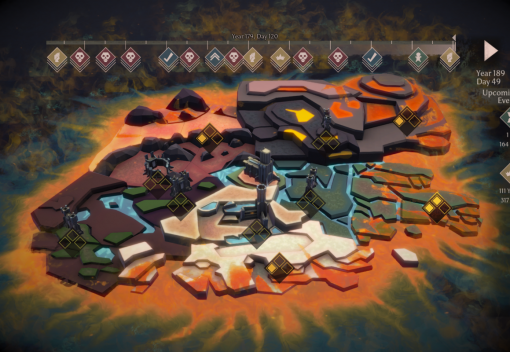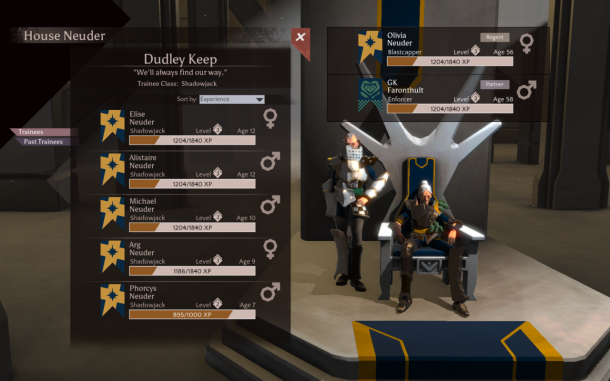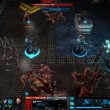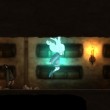Massive Chalice Review
Decades of what we'll call... light incest finally blew up in my face. I'd crushed the Cadence at every turn for 150 years. They could not stand up to the unified might of the houses that protected the realm, the houses that had fought the demonic incursion for generations. Their ancestors had lived and died--some on the battlefield, more at home in their beds; they had married and borne children and ruled the lands. But they were mortal, and I was not, and I didn't merely witness the rise and fall of dynasties: I guided them. I forged marriages and alliances and ensured a stream of children for the war effort. But... best laid plans and whatnot... I learned that I was not cut out to meddle in eugenics.
I'd spent so long focusing on maximizing the fertility of the land that I'd lost sight of a more important concern: can any of these love-crazed rabbits actually fight? And while my soldiers were many, they were weak; my hunters (read: archers) had the vision of Mr. Magoo and the mobility of Chris Redfield in the 1996 Resident Evil. My men had grown stagnant, but the Cadence had grown strong. Decisive victories were turning into near scrapes with destruction, and I knew when my last hunter died that my land was not long for this world.
Massive Chalice allows experiences like that one to flourish. Using a centuries-spanning war to weave its experiments, Massive Chalice is a game where accidents of birth, marriage, and being aged to death by eldritch abominations spreads ripples of repercussions across the decades and centuries. Here is a world brought to life through decisions that are wisely given time to breathe before they bear fruit. And it's a shame that experiencing those tales can be so intermittently tedious.
In Massive Chalice, you control an immortal ruler tasked with defending his nation against the omnipresent demonic scourge, the Cadence. In 300 years, a magical chalice will awaken and destroy the Cadence once and for all. But you must keep the kingdom alive until that happens.


And thus forms the basis of Massive Chalice's two major gameplay elements: grand marital strategy and turn-based tactical combat. In one half of the game, you must improve your land (through building population-supporting keeps, research-focused guilds, and military buildings), arrange marriages between the heroic bloodlines that keep the realm safe and thus ensure continuing generations of heroes, and guide the research efforts of the war. In the other half of the game, you lead squads of five soldiers (whose birth you might have arranged decades ago) into battle against the hordes of the Cadence.
The grand strategy portions of Massive Chalice provide its most organic memories, although, beyond the marital/breeding hijinks, the moment-to-moment interactions never equal the realization that decades of genetic planning (inadvertent or otherwise) brought you to victory or ruin. Heroes are divided by class, genetic traits, and personality types. If you marry heroes of the same class, they have children of that class. But if you marry heroes of different class, they have children of hybrid classes. And since the only heroes capable of reproducing are chosen by you, you can amass carefully constructed armies of diverse fighting forces that grow ever stronger or you can breed your ranged class to extinction because you forgot to marry any of them off.
Heroes have genetic and personality traits. They might be slow, or predisposed to having daughters, or small, or infertile. And (other than infertility), they can pass these traits on to their children. Suddenly, you find that you're producing an absurd number of men in your kingdom compared to women, and you remember marrying too many men with the "Produces More Sons" trait. Or you find yourself with those archers that can't shoot that I mentioned, because the house that was your archer factory features two spouses making kids genetically predisposed to being "nervous" (which lowers accuracy). Or by some miracle (because you know you didn't think about it enough), your melee families all have strong bodies and rarely miss. Watching your realm swing from crushing the Cadence to barely surviving because of bad genetic planning should be frustrating, but in Massive Chalice, it is more often amusing because you remember how you could have avoided the disaster.
But Massive Chalice extends you the invitation and then offers you a half-empty world in return.

There are also moments where the game presents you with choices and moral conundrums. Peasants riot in the West due to shortages caused by the war. One of your heroes kills a peasant trying to keep the peace. Do you sacrifice this potential hero? Or do you crush the peasantry? Multiple playthroughs reveal that the consequences of even these choices have an element of randomness, so you’re always kept on your toes about how your decisions will play out. These decisions can have consequences that are more frustrating than fair, though. The last remaining member of a family can die in childbirth. Rational decisions can have catastrophic consequences, removing members of your Vanguard (your squad) for a decade--if not more--and then returning them with negative personality traits. There's a fine line between "keeps you on your toes" and "cruel," and Massive Chalice plays hopscotch with that line.
Some choices are more silly and endearing. Do you feed a wild ostrich? Do you go on a deranged hot air balloon ride? They add levity and personality to a game where genuine personality is abstracted at most turns. You have the option to put the Double Fine spin on the biblical Judgment of Solomon (though this time it involves placing a baby in your magical chalice instead of cutting it in half). You can force two feuding heroes to go on a walkabout around your war-torn land thinking it will cure their anger, only for them to return angry at you instead of each other. These choices maintain the random absurdity of the more serious choices, but they are less frustrating because they at least illicit a chuckle instead of bitter curses.

Where the grand strategy campaign falters is, sadly, everywhere else. The sheer randomness of the gene pool you're presented with at the beginning of the game means it's easy for one of the three core classes to be extinct by the time you build your second keep, just because the few heroes born into that class were cursed with the "short lifespan" trait. Or all of your alchemists have the reveler trait from the start and so you're stuck with a line of drunks for the next three hundred years and you never quite know when a member of your vanguard is going to wake up with a hangover and ruin your mission. It doesn't help that the game's ability to present information to the player is obtuse at best. I ran multiple saves of Massive Chalice before I felt I had a proper handle on its mechanical quirks (and then I ran several more as I began to grasp the complexity of the genetic interplay).
It's also impossible to discuss Massive Chalice's strategic elements without bringing up XCOM: Enemy Unknown, because its design is borrowed quite liberally from that game. You make research, marital, and building decisions and then fast forward through the years until something happens that requires you to respond. Regions of the map are attacked by the Cadence at the same time, and you have to choose which land to help, which sows "corruption" in the region you didn't help, which can then lead to the permanent loss of regions if you continually ignore their needs. Bits of fallen enemies can be used to research better weapons and armor. Remove the marriage and breeding elements of the game, and Massive Chalice would veer close to being Fantasy XCOM in a way that feels less like homage and more like an unashamed clone. The research, production, and macro-military elements are about as thin as a heroin chic model, and if you can keep your heroes alive, the strategy offers so few meaningful choices that it becomes impossible to screw things up beyond poor genetic planning. By the 100-year mark, research and building decisions begin to feel like busywork to keep you occupied between battles rather than important moments in the battle for survival of your kingdom.
When the game puts so much effort into creating a genetically diverse breeding pool of clashing and conflicting personalities, it's disheartening that none of it can be seen on the field.
On the battlefield, things only fare slightly better. Although there are a host of classes in the game, they're broken into three core ideas: melee, ranged, and control. You're free to mix and match your squad of five heroes however you see fit (I tended to stick to two ranged, two control, and one melee). And then you're loosed in turn-based tactical combat within the game's sprawling environments. But that's partially where the game's combat falls apart.
Massive Chalice's maps are huge. If you're moving cautiously around the map, you can waste minutes inching around the levels hoping to bump into the enemy. And whatever algorithm/design principle Massive Chalice is using to generate enemy layouts on these maps is comically out of balance. Combat missions range from easy walks in the park with monsters healthily spaced out to cramped spaces with monsters packed into a singular corner of the map. This would be less problematic if Massive Chalice's combat weren't designed around fighting enemies in manageable packs. Fighting large swarms at once is a recipe for instant death.

It's even more frustrating because the core loop of Massive Chalice's combat can be good. Executing feints and lures to manage enemy unit size and inventing fresh ways to counter the Cadence's deliciously evil ways to hurt you (including attacks that age you and kamikaze poison plant monstrosities) is endlessly satisfactory. Combat is simple: you're limited to a small suite of abilities and items, but there's a synergy to the way the classes play off each other. And you're given enough agency to execute plans and watch them fall together (or go hilariously, miserably wrong). Some enemy combat abilities are outright broken. One enemy can teleport you across the field. If you can't kill it before it attacks, it can wreck all of your careful tactical planning. The aging effect of another enemy is merciless in a game where aging and mortality are constant specters. The length of Massive Chalice's battles is an exercise in pop relativity; if you settle into the groove and the Cadence isn't spaced preposterously apart, it can fly by. But if you're stuck wandering around in an aimless haze, you'll feel every agonizing second of fights that regularly push past the twenty-minute mark.
For a game that places such granular mechanical focus on the personalities and genetic makeup of the heroes you produce, the writing and aesthetics of Massive Chalice never translate this in a meaningful way. If much of Massive Chalice is a less complex XCOM, your heroes' traits become a less charming Valkyria Chronicles. For instance, I didn’t realize that one of my "reveler" heroes was hungover until he suddenly couldn’t move as many spaces. Characters that are "strong-willed" (which means they're unlikely to get the traits of their parents) don't project any force of personality on the field. When the game puts so much effort into creating a genetically diverse breeding pool of clashing and conflicting personalities, it's disheartening that little of it can be seen in battle.

The heroes of Massive Chalice felt more real to me as mythic heroes of bloodlines--their indelible effect on generations of warriors not fully understood--than they did as the figures they cut in battle. In the grand strategy portions, they were part of families with house sigils and house words and adopted children. On the field, they were hit point boxes killing other hit point boxes and I couldn't care less about them as individuals beyond being tools for securing ultimate victory. The game's lifeless artwork did little to alleviate this problem. Although watching the members of your Vanguards or Regencies age and wither away until death was fascinating, the look of the heroes was devoid of detail, and left me with an endless trail of blonde/brunette/ginger men and women with caberjack/crossbow/alchemist claws.
That's ultimately Massive Chalice's most unfortunate shortcoming. It’s a game with enough ambition and execution to spark the imagination, and enough organic entropy to let you suspend your disbelief about the families you help sire. But Massive Chalice extends you the invitation and then offers you a half-empty world in return. Massive Chalice's entropy speaks to me. The random chaos that one marriage can wreak over the decades is a mysterious well of excitement. But the flatness of its world and the tedium of several core elements of the Massive Chalice experience is a high price to pay.









